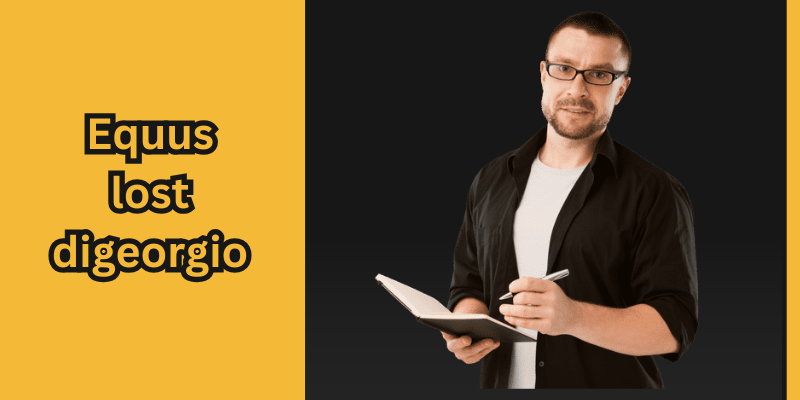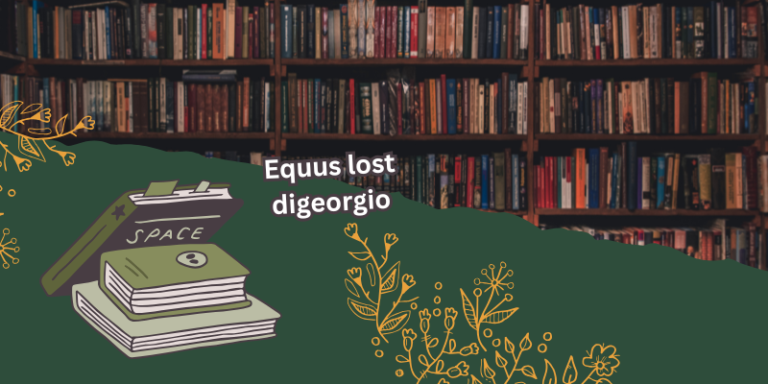Equus Lost by Francesco De Giorgio offers an insightful, groundbreaking look at the relationship between humans and horses, challenging traditional perspectives in equine training. Known for his innovative and compassionate approach, De Giorgio reimagines horsemanship as a deeply empathetic practice, one that focuses on understanding the horse’s intelligence, emotions, and individuality.
Who is Francesco De Giorgio?
Francesco De Giorgio is a highly respected animal behaviorist, philosopher, and trainer who has dedicated his life to studying animal cognition and communication. His work has spanned multiple species, but his book Equus lost digeorgio focuses on horses, advocating for a shift in how humans understand and interact with them.
Overview of Equus Lost
In Equus Lost, De Giorgio dives into the heart of human-horse relationships, arguing that we must rethink the conventional, often control-based methods of training. Through this book, he shares insights on animal cognition, emotional intelligence, and the importance of connection over control, calling for a more ethical and empathetic approach to training.
The Core Philosophy of Equus Lost
Central to Equus Lost is the philosophy that horses, like humans, are complex beings with thoughts, emotions, and an intrinsic desire for meaningful interaction. Rather than viewing horses as tools to be mastered, De Giorgio suggests we see them as partners in a relationship rooted in respect and empathy.
De Giorgio’s Approach to Animal Cognition
A critical component of De Giorgio’s philosophy is his emphasis on animal cognition. He believes that horses possess unique intelligence, one that is often overlooked in traditional training, which tends to emphasize obedience over understanding.
- Understanding Animal Intelligence: De Giorgio encourages trainers to recognize the horse’s ability to think, feel, and respond meaningfully.
- Empathy in Training: He argues that empathy, not dominance, should be the foundation of the human-horse relationship, allowing both species to connect on a more profound level.
Challenging Conventional Horsemanship
In Equus Lost, De Giorgio critiques conventional training methods that rely on dominance, submission, and control. He believes these approaches fail to respect the horse’s individuality and lead to a loss of genuine connection.
- Critiques of Traditional Methods: De Giorgio questions practices that treat horses as machines, arguing that they suppress the animal’s natural intelligence and emotions.
- Vision for Ethical Horsemanship: He advocates for a kinder, more thoughtful approach that recognizes and values the horse as a sentient being.
Horse as a Conscious Being
De Giorgio’s philosophy invites readers to view horses as conscious beings with rich inner lives. According to him, respecting the horse’s mind and emotional world is essential to building a healthy relationship.
- Emotional Depth of Horses: He emphasizes that horses, like humans, experience a range of emotions and that acknowledging this depth can enhance training and communication.
- Respecting the Inner World: De Giorgio argues that a relationship built on mutual respect allows for more genuine interactions, leading to better outcomes in training.
Equine Psychology and Behavior
Equus Lost also delves into equine psychology, offering insights into horse behavior and how it can be interpreted. De Giorgio believes that by understanding a horse’s body language and non-verbal cues, trainers can communicate more effectively and compassionately.
- Interpreting Behavior: He provides readers with tools to decode horse behavior, emphasizing the importance of subtle cues.
- Non-Verbal Communication: De Giorgio highlights how much of human-horse interaction relies on non-verbal communication, which, when understood, fosters trust and understanding.
The Role of Trust and Mutual Respect
Trust and respect are pillars in De Giorgio’s philosophy. He believes that only by prioritizing these values can humans and horses form a bond that goes beyond mere training.
- Building Relationships: De Giorgio advises that trust should be established through consistent, positive interactions rather than fear-based tactics.
- Key Practices for Trust: His techniques emphasize patience, empathy, and clear communication to build lasting relationships with horses.
Shifting from Dominance to Partnership
A core message of Equus Lost is the shift from dominance to partnership in horsemanship. By treating horses as equals, De Giorgio argues, humans can create more balanced, fulfilling relationships that benefit both parties.
- Moving Away from “Mastery”: Traditional horsemanship often promotes “mastery” over horses, but De Giorgio advocates for a collaborative approach.
- Benefits of Partnership: By viewing horses as partners, trainers can unlock new levels of cooperation, communication, and success in training.
Training Techniques Inspired by Equus Lost
De Giorgio suggests several practical techniques that align with his philosophy of empathy and respect. His methods are based on positive reinforcement and communication rather than force.
Case Studies and Real-World Applications

Equus Lost includes real-world examples of trainers who have adopted De Giorgio’s methods. These stories highlight the benefits of his approach, showing how understanding and empathy lead to more rewarding human-horse relationships.
Impact of Equus Lost on the Equine Community
De Giorgio’s book has had a significant influence on the equine community, inspiring trainers, owners, and animal advocates to rethink their approach to horsemanship.
Criticisms and Debates Surrounding Equus Lost
While Equus Lost has garnered widespread support, it has also faced criticism from those who prefer traditional methods. De Giorgio’s approach challenges long-held beliefs, leading to debates within the equine training community.
Conclusion
In Equus Lost, Francesco De Giorgio calls for a paradigm shift in horsemanship—one rooted in empathy, respect, and understanding. By viewing horses as conscious, intelligent beings, De Giorgio’s approach fosters deeper connections and redefines what it means to truly work with these remarkable animals.
FAQs
- What is the main message of Equus Lost?
Equus Lost advocates for a shift from control-based training to a relationship founded on empathy and mutual respect. - Why does De Giorgio criticize traditional horsemanship?
He believes traditional methods overlook the horse’s intelligence and individuality, focusing too much on dominance. - Is Equus Lost suitable for all horse owners?
Yes, Equus Lost provides insights beneficial to both new and experienced horse owners. - What is unique about De Giorgio’s training techniques?
His techniques emphasize positive reinforcement, communication, and empathy over force or control. - How can Equus Lost benefit the equine community?
By promoting ethical and respectful training, Equus Lost encourages a more humane approach that can improve relationships between humans and horses.

